Last Updated on January 16, 2024 by Greg Gillson
Many people feed birds in winter. Some keep it up all year. But then the question arises, should you?
Should you feed birds all year round? If not, what time of year do you feed birds? And when should you take down your bird feeders? Here’s what the experts say:
- Audubon Society: Feed the birds all year, but clean your feeders between seasons
- National Wildlife Federation: Feed birds all year, except if you have bears(!)
- RSPB: Feed birds all year, but not peanuts, bread, or fat during the nesting season
- Cornell Lab of Ornithology: Feed birds all year, change up the foods, keep it clean
- The Humane Society: Don’t feed birds in summer, except hummingbirds and goldfinches
Let’s look a little more closely at articles posted on the websites of these expert bird watching and wildlife organizations.
1. National Audubon Society says:
In her article: “To feed, or not to feed” (source) writer Jennifer Huizen quotes an article in the science journal “Nature,” that 40% of Americans regularly feed birds.
But she looked at one study out of the University of Georgia that indicates that feeding birds can contribute to increasing the spread of communicable diseases among birds. The author of that study, Daniel Becker, does NOT tell us to stopping feeding birds, though.
As Huizen notes, in northern climes with harsh winters feeding birds really does help keep them alive.
Instead of taking bird feeders down at any particular time of year, Stephen Kress of the Audubon Society recommends thoroughly cleaning your feeders several times per year.
I thought it was interesting that Kress gives another reason for not buying mixed bird food: disease prevention. Mixed foods attracts many different species together to the same feeder, increasing the chance to spread diseases among the birds.
So to summarize this article: Go ahead and feed birds–even all year round–but clean your feeders regularly to prevent birds from getting sick.
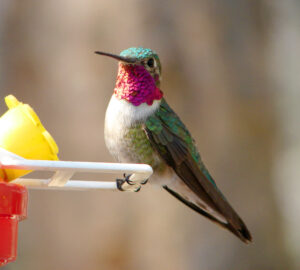
2. National Wildlife Federation says:
Laura Tangley’s article in the National Wildlife Federation’s blog is titled: “Summer Bird Feeding: the Case For and Against” (source). She comes at the issue of summer bird feeding from an angle I hadn’t considered before.
Tangley had always taken her feeders down in spring and not put them up again until late fall. Her reasoning was that the birds had plenty of natural food and didn’t need her feeders. She also had another reason. She had heard a rumor that feeding birds could change a bird’s migration timing.
First of all, she debunks the idea that feeding birds in spring might disrupt a bird’s migratory pattern. In a discussion with backyard birding expert George H. Harrison, she learned that there is no evidence that feeders alter the migration timing of any bird species.
Harrison mentions the joy of birding in summer when you will see some birds not present in winter. The added bonus is that they will be in their colorful breeding plumage.
And later in summer, parent birds will introduce their offspring to your feeders! The young birds learn that bird feeders provide a source of nutrition. This learned knowledge of where to find food may help them survive come winter.
Surprisingly, though, the second half of the article dealt with bears! Evidently, in some less-developed areas, bears raid bird feeders in spring. That’s bad enough. However, they keep coming back and get bolder in wanting food in residential areas. This puts them in conflict with homeowners and their pets. For this reason, then, if you live in bear country, feeders should be taken down whenever bears are most active.
To summarize: Feeding birds all year is fine, even beneficial, just as long as you don’t have bears!
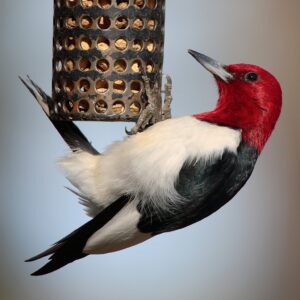
3. Royal Society for the Preservation of Birds says:
The RSPB discusses year round bird feeding in the article “When to feed garden birds” (source). This article comes at bird feeding from the point of view that feeding birds is a necessary supplement to natural food shortages during the year.
In the autumn and winter this article recommends feeding fatty food and water for providing energy to get through the cold nights. It suggests filling your feeder twice a day, but not to over-feed.
In spring and summer the RSPB says to feed high protein foods such as black oil sunflower seeds, mealworms, fruits, etc. This post warns against peanuts, fat (suet), and bread in summer, as parents may feed this to their young if natural foods are in low supply. These foods may choke the nestlings, this article claims. This article actually repeats the warning not to feed peanuts, dry hard food, bread or fats during the breeding season.
Summary of this article: Feed birds all year round, but change the type of food seasonally.
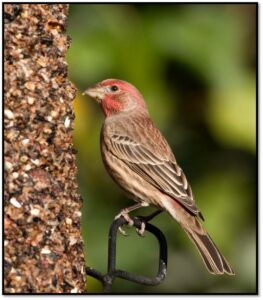
4. Cornell Lab of Ornithology: All About Birds says:
All About Birds has an in-depth article about what to feed birds in summer, not even acknowledging that there might be a question about doing so. The article has the clunky title: “Here’s What to Feed Your Summer Bird Feeder Visitors” (source). It was written by Gustave Axelson.
In a short introduction this post mentions summer visits by parent birds and their new fledglings and the occurrence of some different species in summer as compared with winter.
The first subheading covers hummingbird nectar and feeding hummingbirds as a summertime activity. Certainly that is so for must of the country where winter is a harsh season with no hummingbirds. Anna’s Hummingbirds are residents year round from Vancouver, British Columbia, south through the western halves of Washington State and Oregon, most of California, and residential areas of Arizona.
The next three subheadings in Axelson’s article are about feeding oranges to orioles, sunflowers to grosbeaks and mealworms for bluebirds.
Finally, Axelson dives into some of the problems that summer bird feeding may encounter. He includes cleaning the feeders. He mentions that suet should be put in the shade so as not to turn rancid. Of course, farther south, suet will not survive the continuously higher summer temperatures. And he finally closes with a warning about bears. I didn’t realize it was such a problem.
Summarizing this article: Feed birds all year; in summer add fruit and hummingbird nectar. Be aware of common problems encountered feeding birds in summer.
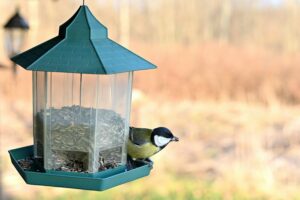
5. The Humane Society says:
The Humane Society has a different take in their article “Feeding your backyard birds” (source). There is one subheading in this question-and-answer post titled: “Should I feed birds year-round?”.
While acknowledging that feeding birds in the winter can be beneficial, they are less enthusiastic about feeding birds in summer. In fact, rather than benefitting birds-of-the-year by providing easy food sources, this article says the opposite may happen. The post says that birds need to learn how to find natural foods on their own. The recommendation here is to stop feeding birds in summer.
The exceptions that the Humane Society mentions are hummingbirds and goldfinches. Hummingbirds appreciate the nectar to refuel their high metabolisms. And goldfinches nest later in summer when the thistle blooms, so may need supplemental sources of small seeds until mid-summer, later than other birds.
Summary: Stop feeding birds in summer except for hummingbirds and goldfinches.
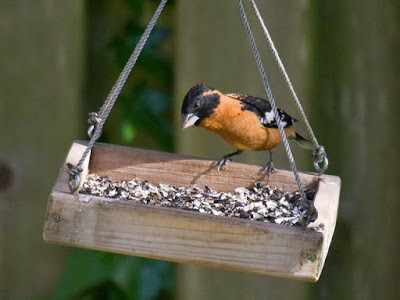 |
|
Photo by Greg Gillson
|
What time of year do you feed birds?
The consensus is clear. You can feed birds all year long.
You will have many of the same resident backyard birds all year. There also will be several migratory species that occur only in winter or only in summer. There’s no need not to feed them, even though summertime bird feeding might not be as necessary as wintertime feeding.
In most cases, feeding birds is about the joy of watching them more than an actual “need” or dependence upon human-supplied food that birds may need. The northern edge of the range of some half-hardy bird species in recent years has advanced northward, assumably in response to having winter feeding stations. For instance, the range of Tufted Titmouse in the East has expanded northward steadily over the last 70 years. Bird feeding is thought to be the major contributor to this observation.
The only point of contention I found was whether fledglings benefit from bird feeders or not. Two of the experts (National Wildlife Federation and Cornell Lab or Ornithology) endorsed feeders for fledglings. Two other experts disagreed. The Royal Society for the Protection of Birds objection was that adult birds, during temporary local food shortages, might feed peanuts or bread to nestlings, causing them to choke. Once the young birds are out of the nest, the Humane Society felt that the fledglings should learn to find food on their own.
None of these experts mentioned water as part of “bird feeding.” Yet I believe that having fresh water may be a greater need than food. In winter, natural water sources may freeze for days. In summer, these sources may dry up or become choked with algae. Having a clean source of water for drinking and bathing should be considered a vital part of bird feeding.
When should I take down my bird feeder?
It is not necessary to take down your bird feeders seasonally. However, there may be times when it is prudent to take down your feeders, at least temporarily.
- Any time feeding birds might cause harm
- If food goes bad
- If you get mold or algae in bird bath
- If you have trouble with bears
- If a Cooper’s or Sharp-shinned Hawk regularly hunts at your feeder
- If you notice diseased birds at your feeder
- If your feeders are taken over by larger birds or nighttime critters
The Humane Society in the post referenced above gives excellent common-sense guidance on when to feed birds and when not to feed them. It states that we should not feed birds when it might cause harm.
With that in mind, when might feeding birds cause harm, prompting us to take down our bird feeder?
If you decide not to feed birds in summer, don’t take your feeders down too soon. Migrant orioles and tanagers migrate in April and May. They will be attracted to orange halves, raisins, jelly. And what a joyful explosion of color these birds add to your backyard! Likewise, Rose-breasted Grosbeaks (East) and Black-headed Grosbeaks (West) would love your seed feeder, all summer long if you live in the northern half of the United States and southern Canada where they are summer residents, not just migrants.
Suet feeders should come down any time it turns rancid. Suet will handle a few days of warm weather, but once the constant heat of summer comes the suet will melt or turn rancid quickly. By this time birds will be finding nice fat juicy bugs, so the suet isn’t necessary until cool fall weather comes again.
Likewise, anytime hummingbird nectar becomes cloudy with bacteria, or black mold grows, it should be taken down. The feeder should be washed thoroughly before adding fresh nectar. Soak in a 10% bleach solution or 50% vinegar solution. Avoid soap, which, evidently, hummingbirds can taste and don’t like.
Clean bird baths and fountains regularly. Scrub with 10% bleach solution to kill mold and algae. Don’t let them sit with stale water that may attract mosquitos. If you can’t keep the water clean and safe, take it down.
As already discussed, if you live in bear country, take feeders down by April 1 and delay putting them back up until November 1. Check any local ordinances or advice of wildlife specialists.
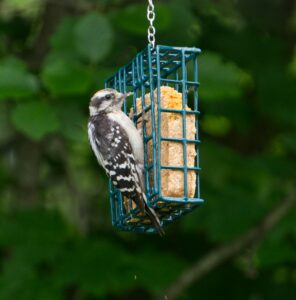
It can be exciting to spot a Cooper’s Hawk or Sharp-shinned Hawk in your backyard. However, you may not want to provide these bird hawks with a constant source of fat sparrows and finches from your feeder. I found one reference that Cooper’s Hawks eat up to 12% of their body weight each day. I assume it is similar for Sharp-shinned Hawks. Of course, these hawks also eat mammals. But if they did eat only birds, how many birds does a Cooper’s Hawk eat in a day? Males are much smaller than females in these hawks. Sharp-shinned Hawks weigh about 3.0-7.7 ounces. Cooper’s Hawks weigh 7.8-25 ounces. A House Finch averages 0.78 ounces. Thus, at 12%, Sharp-shinned Hawks would average 1/2 to 2 House Finches per day, if that’s all they ate. Cooper’s Hawks would average 2-4 House Finches per day, if that’s all they ate. You may want to stop feeding birds until these hawks find a new hunting ground.
Diseased birds are another reason to stop feeding and take down your feeder. Sick siskins or goldfinches sitting inactive on the feeder or dead underneath are a good clue that you may be dealing with a communicable disease. House Finches may have a grossly swollen eye. Take the feeder down for 2 weeks until all the sick birds have died (or been eaten by the Cooper’s Hawk). Clean and scrub the feeder with 10% bleach solution.
If your feeders are taken over by starlings, blackbirds, grackles, crows, jays or other undesirable larger birds, remove food from tray feeders and perhaps only feed from tube feeders or feeders with cages around them that keep out larger birds. If the larger birds aren’t getting anything to eat they will move elsewhere eventually. And don’t ever feed human food waste (bread, meat, other). You may find that you’re feeding an entire nighttime menagerie of rats, raccoons, opossums, skunks, and other critters.
There are a lot of reasons to take down your feeders. But “summer” isn’t one of those reasons.
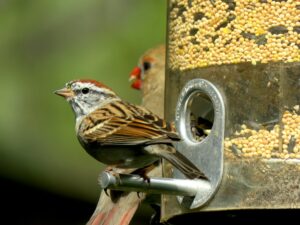
Wrapping Up
Feeding wild birds can be very rewarding and as I have shown, can be done all year round. Here are some general tips about feeding birds in your backyard.
Food Choice:
Offer a diverse mix of seeds, nuts, fruits, and suet to cater to different species and dietary needs. Black-oil sunflower seeds are a crowd-pleaser, while peanuts, berries, and mealworms attract specific birds.
Avoid moldy or stale food, as it can be harmful to birds. Choose high-quality birdseed blends and fresh fruits and nuts.
Tailor your offerings to the season. Provide high-energy foods like suet and nuts during winter for warmth and fat reserves, and offer fresh fruits and berries in summer for hydration and nutrition.
Feeder Selection:
Choose feeders that are easy to clean and disinfect regularly to prevent the spread of diseases. Opt for wire mesh or metal feeders that allow for drainage and ventilation.
Place feeders away from windows and walls to prevent collisions, and out of reach of predators like cats and squirrels. Hanging feeders in bushes or trees offers protection and a sense of security for birds.
Consider offering different types of feeders for different food types. Tube feeders are ideal for sunflower seeds, while platform feeders work well for fruits and suet.
Additional Tips:
Provide a clean and accessible source of fresh water near feeders. A birdbath or shallow tray will offer vital hydration, especially during hot weather.
Plant bushes and trees around your feeding area to offer birds natural protection from predators and harsh weather.
Watch the birds frequenting your feeders and adjust your offerings based on their preferences and the changing seasons.
Frequently Asked Questions
Do wild birds know I feed them?
Whether wild birds explicitly “know” you feed them in the human sense of understanding and gratitude is difficult to say definitively. Birds, after all, don’t possess the same cognitive abilities as humans. However, there’s no doubt that birds can learn to associate positive experiences like finding readily available food with specific locations and features, like your feeders. Here’s how:
Memory and association: Birds have remarkable memories and can quickly learn to associate certain areas with reliable sources of food. If they consistently find tasty treats at your feeders, they’ll likely remember and return. They might even chirp excitedly to alert other birds in their flock about the bounty!
Observational learning: Birds are keen observers and often learn from each other. Seeing other birds flocking to your feeders can pique their curiosity and encourage them to investigate, potentially leading them to discover your feathered feast.
Habit formation: Once birds establish a successful feeding routine at your location, they’re likely to stick with it. The predictability and ease of access can be attractive, especially when searching for food.
So, while birds might not express human-like “knowing” or “thankfulness,” their repeated visits and eager anticipation at your feeders are a clear indication that they’ve learned to associate your backyard with a reliable source of delicious sustenance. You’re essentially creating a welcoming avian oasis they can depend on, and that’s something to be proud of!
Will wild birds starve if I stop feeding them?
In most cases, wild birds will not starve if you stop feeding them, especially those living in urban and suburban areas. There are several reasons for this:
Natural foraging skills: Wild birds have evolved over generations to be resourceful and skilled at finding food in their natural environment. They can utilize a variety of food sources like insects, berries, seeds, nuts, and fruits depending on the season and their species.
Adaptability: Birds are highly adaptable creatures and can quickly adjust their foraging patterns and diet based on available resources. If your feeders disappear, they’ll simply shift their focus to other food sources in your backyard or surrounding areas.
Abundant alternative sources: In populated areas, particularly suburbs and cities, birds often have access to diverse food sources beyond backyard feeders. This includes gardens, parks, trees, fallen fruits, and even discarded scraps – a surprising buffet for them!
Flocks for support: Many bird species forage in flocks, which allows them to share information about food sources and increase their chances of finding sustenance. This collective ability further reduces the risk of starvation when one source disappears.
Do wild birds trust humans?
Whether wild birds “trust” humans in the same way we trust each other is a complex question, as bird cognition and understanding are quite different from ours. However, their behavior can offer clues about how they perceive us:
Fear and avoidance: Most wild birds instinctively fear humans as potential predators. Their evolutionary history makes them cautious of large, bipedal creatures. This often manifests in them fleeing when we approach, hiding in foliage, or sounding alarm calls.
Tolerance and habituation: Birds living in urban and suburban environments, exposed regularly to human presence, develop a certain tolerance. They learn to coexist with us in shared spaces, often ignoring our activities as long as we maintain a safe distance. Some species, like pigeons, even adapt to relying on human discards for food.
Positive associations: Certain factors can encourage birds to view humans more positively. Providing consistent food sources like feeders, nesting boxes, or birdbaths creates a positive association, prompting them to approach with less fear and even anticipation. Likewise, observing our calm and respectful behavior can gradually reduce their apprehension.
Individuality and species differences: Trust is not a uniform concept among birds. Each species and even individual bird has its own personality and experiences, influencing their level of comfort around humans. Some species, like crows and jays, can exhibit remarkable intelligence and curiosity, potentially leading to more complex interactions with humans.
Related Article: How to set up a bird feeding station in 6 easy steps!


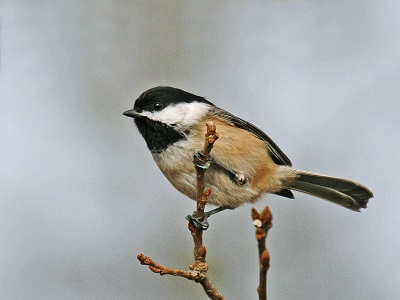
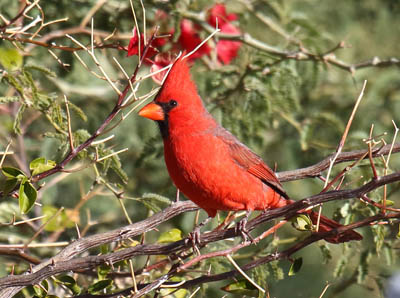
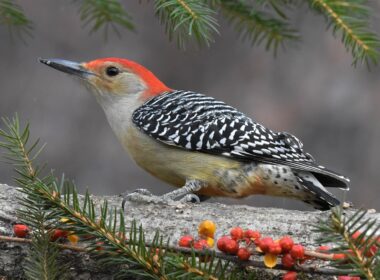
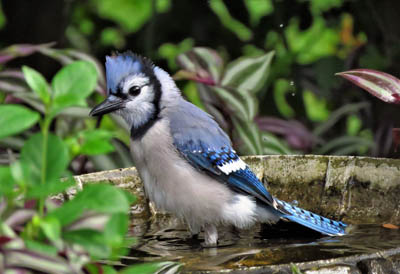
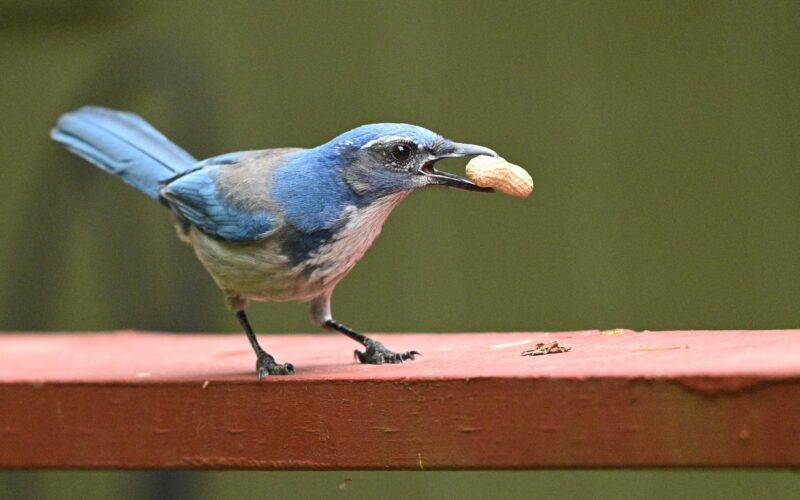
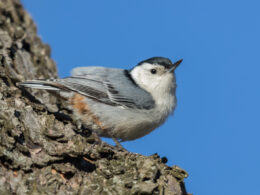
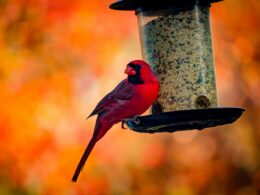
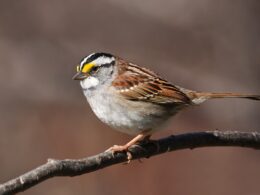
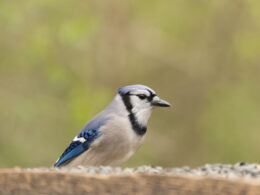
Hunters are outdoor enthusiasts who typically find that their hunting binoculars satisfy their optical needs during the rest of the year. If you're looking for a hunting binocular, check out https://huntingprofy.com/best-low-light-binoculars-for-hunting
Thank you for stopping by, Francis.
Thanks, Greg. We had black bears at the feeder until about 1985. After that, I stopped using feeders and began to spread the seed, using a broad scatter, under trees and bushes. Yes, some squirrels showed up, (probably field mice but that never became an issue) as well as crows and turkeys, but all the little birds ate their fill. Never saw signs of bears. I think this might decrease communicable disease transmission as well. Charlie K.
Thanks, Charlie. That seems like a good way to do it in your case.